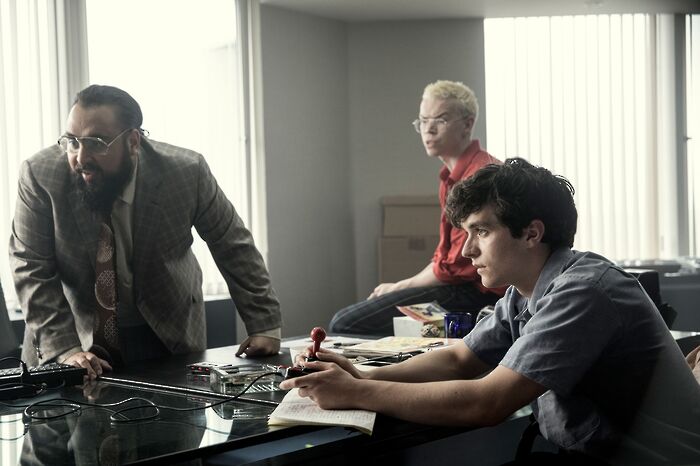Following You
After watching Netflix’s latest hit-show, Shannon Phillips questions just how far social-media stalking should go

Developed by Greg Berlanti and Sera Gamble
Starring Penn Badgely, Elizabeth Lail, Luca Padovan
Currently available on Netflix
It’s the season for guilty binge-watching and You makes for delightfully creepy late-night viewing. After spending a few months airing on TV very much under the radar, You has recently been enjoying an explosion in popularity following its availability on Netflix. But why the sudden surge in interest?
Meet Joe Goldberg (Penn Badgley), the adult-world, book-store managing reincarnation of Gossip Girl’s Dan Humphrey, complete with self-righteousness and sarcastic social commentary. Except this time we’re privy to his inner monologue from the beginning.
In the first scene, aspiring writer Guinevere ‘Beck’ (Elizabeth Lail) swans into Joe’s bookstore and the two converse flirtatiously. They judge the choices of other customers and chat about different authors, but in the end she leaves without passing on her number. So Joe does what any of us would do: he tracks her down on Facebook and Instagram. Scrolls casually through her photos. Finds her address. Steals her phone and reads her text messages. Follows her to various social gatherings. From the get-go, You veers from satirical romantic drama into true crime and back again. It subverts typical genre tropes at every corner and takes you along for the ride. Of course it’s not entirely believable – take Joe’s magic baseball cap of invisibility or Beck’s ability to write bestsellers under duress. Still, it’s clever enough to be entertaining.
You is a social media horror story with the killer hiding behind shower curtains and jars of teeth stashed in the bathroom tiles. Beck is relatable in that she is incredibly blasé about her privacy settings, as most of us are. At some level we all suspect Facebook is listening in on us even though we do nothing about it. In this narrative, Beck’s carelessness leaves her open to observation and eventually to manipulation and heartbreak. Joe seems to think he sees the ‘real’ version of who Beck is and not the fake social media persona she projects to the world. Joe himself is social-media shy (when he’s not using it for stalking purposes), disdaining people’s false façades and vain ambition for the ‘authenticity’ of his rare books and vinyl. Of course, as an audience we are aware that Joe’s good-guy presentation is a façade masking his psychotic tendencies and need for control.
Because Joe steals Beck’s phone early in the show, we’re also given a unique angle on dating in the 21st century. Haven’t many of us wanted to know what the other person was thinking when we starting dating them? Was that moment significant? (Yes!) Do their friends like me? (No!) Was the sex just as bad for them? (Definitely.)
Throughout the show Joe is made to be uncomfortably relatable. As he justifies his own actions, we are caught agreeing with him, secretly hoping he gets away with whatever he is planning. After all, he’s doing this in the name of love, right? But this is not the Breaking Bad anti-hero story of Walter White where the protagonist ends up unwittingly doing the wrong thing in spite of good motivations. At points it does appear that way, especially when Joe is playing the supportive boyfriend. Instead, his underlying motivation is selfish. He has to be in control. He wants to do what’s best for Beck, provided it’s on his terms. Joe spends all of his time striving to remove the obstacles between him and Beck, whatever the personal cost to Beck herself. She has many unhealthy relationships which she comes to realise she’s better off without, but in attempting to solve all of Beck’s problems for her, Joe removes her of any agency. It is a damning reminder that even as we try to help the ones we love, we need them to want to help themselves.
Instead of being a nuanced anti-hero, Joe is a villain who ends up doing some good along the way. The audience is left more than a little disgusted by him at the end of the show. Even the potentially redemptive subplot with his next-door neighbour's kid turns to corruption in the end. The narrative style also means that we are robbed of Beck’s perspective entirely by the end of the season, thus forcing us to focus solely on Joe’s increasingly manipulative actions. More than being a cautionary tale about social media, You becomes a warning against trusting people blindly – on social media or otherwise.
In the end, despite its unique and clever blend of plot twists, tense moments, and genre-hopping, You leaves us with an unsettling message. People aren’t who you think they are… they’re worse
 Music / The pipes are calling: the life of a Cambridge Organ Scholar25 April 2025
Music / The pipes are calling: the life of a Cambridge Organ Scholar25 April 2025 Arts / Plays and playing truant: Stephen Fry’s Cambridge25 April 2025
Arts / Plays and playing truant: Stephen Fry’s Cambridge25 April 2025 Comment / Cambridge builds up the housing crisis25 April 2025
Comment / Cambridge builds up the housing crisis25 April 2025 Interviews / Dr Ally Louks on going viral for all the wrong reasons25 April 2025
Interviews / Dr Ally Louks on going viral for all the wrong reasons25 April 2025 News / Candidates clash over Chancellorship25 April 2025
News / Candidates clash over Chancellorship25 April 2025






